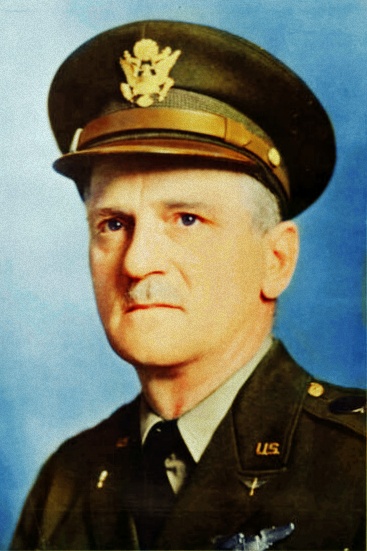Leaders of the second front –
Spaatz, Pantelleria’s conqueror, to lead air assault on Germans
He plays wild poker but knows planes and pilots
By Boyd Lewis, United Press staff writer
Upon a handful of Allied leaders rests the success or failure of the coming “second front” against the European continent. Who are these men? What are they like? Are they capable of the big job?
In this, the fifth in a series of articles, Boyd Lewis of the United Press tells the story of Gen. Carl Spaatz, the man who reduced Pantelleria by airpower alone, and who will lead Eisenhower’s bombers against the continent.

Gen. Spaatz
Lt. Gen. Carl Andrew Spaatz has devoted most of his adult life to an effort to transform airport from a question mark to a sure thing.
He soared into newspaper headlines in 1929 when he took the Army plane Question Mark aloft in a refueling endurance flight and held it there for six days and a new record. His assistant was a young Army captain named Ira Eaker. Both boys have done rather well in flying circles since.
He comes up from the Mediterranean to command the strategic bombing of Germany for Second Front Generalissimo Dwight D. Eisenhower, convinced that he has erased that question mark on American airpower.
If adequate airpower can be applied against the heart of a nation, no other force is necessary, he asserted after Pantelleria hoisted the white flag to airpower unassisted in June of last year.
Nothing has occurred in the course of the air war since that time has caused him to change the idea – one which he has held, incidentally, since he fell under the spell of Gen. Billy Mitchell as a young officer.
Will get bombers
Informed persons believe that the heavy bomber force which will be available to Gen. Spaatz in Britain, soon to include the B-29 super-bombers, will satisfy him as “adequate.” Of course, he will not be asked to reduce Germany by air assault alone.
His task will be to wage a war without front – to pour destruction through the open roof of the Nazi “Fortress Europe” – before, during and after Gen. Eisenhower hurls his massive land forces across a bridge of ships against the German land defenses.
The man behind this 20th-century war-making concept is no winged automation but an extremely human high-stake poker player, fond of strumming a guitar to accompaniment of group singing and addicted to buckets of coffee and chains of cigarettes when under pressure.
In World War I
One of the first American fliers of World War I, he commanded the training center at Issoudon through which virtually every American pilot and mechanic was filtered. He emerged a rabid fan for air war and was delighted to demonstrate it with a flying circus of Army planes after the war. Then followed command of various Army flying fields and training centers until he and Capt. Eaker took the Question Mark up for its endurance record.
Gen. Spaatz’s name is pronounced “spots,” like in spots before your eyes. Because it was too often pronounced “spats” (like what you wear on your feet!} the colorful air officer added another “a” to his name as it was originally spelled, Spatz. He laughingly admits, however, that his friends and enemies have other, and more colorful, names for him from time to time.
While Eaker held the controls, Spaatz would juggle the refueling hose, leaning far out of the supply hatch. At one point in the flight the Question Mark jerked away from the refueling ship, drenching Spaatz with high octane gasoline which would have scarred his skin. Without hesitation, he stripped off his soaking clothes and resumed refueling – stark naked.
A return engagement
He was one of the first officers called by Gen. Eisenhower to join his air-ground team in North Africa. Teaming up with British Air Marshal Sir Arthur Tedder, another red-hot airpower fan, he had ample chance for experimentation, culminating in the reduction of Pantelleria by air.
His return to England will be in the nature of a return engagement because he was stationed there as commander-in-chief of the U.S. Army Air Forces in the European Theater when Gen. Eisenhower recruited him for Africa. His blunt, forthright diplomatic methods and his flamboyant poker playing made him a popular officer among British as well as American circles.
Of his diplomatic methods, these stories are told:
He had been warned that Sir Sholto Douglas, then chief of the Raf Fighter Command, was a formidable individual. When they met, Gen. Spaatz thrust out his hand and said:
I hear you’re damned tough and that you and I aren’t going to get along together. Is that right?
They got along famously from that moment.
‘You’re a general!’
While reviewing the 8th Air Force with Queen Elizabeth, a storm blew up. With the gallantry of a Sir Walter Raleigh, Gen. Spaatz draped his battered air force raincoat over the Queen’s shoulders and said:
Your Majesty, this makes you a major general in the American Air Force.
His poker playing is described as more enthusiastic than expert, he plays generally with an “inner circle” of officers on his own staff who are said to be regarded by old-0timers among airmen poker artists as “easy meat.”
British Air Marshal Sir Arthur Tedder and several correspondents are supposed to have discovered that while the free and easy betting of the Spaatz clique is momentarily disconcerting, they usually fall victim to close-to-the-vest players.


